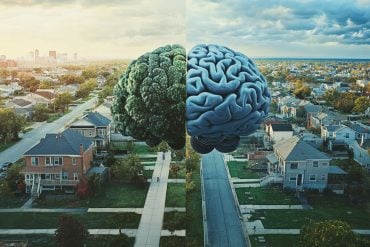Summary: A new study reports mathematical processes in the brain are influenced by language. Studying bilingual people, researchers discovered cognitive ‘extra effort’ is required for solving math problems when presented in the second language.
Source: University of Luxembourg.
People can intuitively recognise small numbers up to four; however, when calculating they depend on the assistance of language. In this respect, the fascinating research question ensues: how do multilingual people solve arithmetical tasks presented to them in different languages of which they have a very good command? The question will gain in importance in the future, as an increasingly globalised job market and accelerated migration will mean that ever more people seek work and study outside of the linguistic area of their home countries.
This question was investigated by a research team led by Dr Amandine Van Rinsveld and Professor Dr Christine Schiltz from the Cognitive Science and Assessment Institute (COSA) at the University of Luxembourg. For the purpose of the study, the researchers recruited subjects with Luxembourgish as their mother tongue, who successfully completed their schooling in the Grand Duchy of Luxembourg and continued their academic studies in francophone universities in Belgium. Thus, the study subjects mastered both the German and French languages perfectly. As Luxembourger students, they took maths classes in primary schools in German and then in secondary schools in French.
In two separate test situations, the study participants had to solve very simple and a bit more complex addition tasks, both in German and French. In the tests it became evident that the subjects were able to solve simple addition tasks equally well in both languages. However, for complex addition in French, they required more time than with an identical task in German. Moreover, they made more errors when attempting to solve tasks in French.

During the tests, functional magnetic resonance imaging (fMRI) was used to measure the brain activity of the subjects. This demonstrated that, depending on the language used, different brain regions were activated. With addition tasks in German, a small speech region in the left temporal lobe was activated. When solving complex calculatory tasks in French, additional parts of the subjects’ brains responsible for processing visual information, were involved. However, during the complex calculations in French, the subjects additionally fell back on figurative thinking. The experiments do not provide any evidence that the subjects translated the tasks they were confronted with from French into German, in order to solve the problem. While the test subjects were able to solve German tasks on the basis of the classic, familiar numerical-verbal brain areas, this system proved not to be sufficiently viable in the second language of instruction, in this case French. To solve the arithmetic tasks in French, the test subjects had to systematically fall back on other thought processes, not observed so far in monolingual persons.
The study documents for the first time, with the help of brain activity measurements and imaging techniques, the demonstrable cognitive “extra effort” required for solving arithmetic tasks in the second language of instruction. The research results clearly show that calculatory processes are directly affected by language.
Source: Thomas Klein – University of Luxembourg
Image Source: NeuroscienceNews.com image is in the public domain.
Original Research: Abstract for “Mental arithmetic in the bilingual brain: Language matters” by Amandine Van Rinsveld, Laurence Dricot, Mathieu Guillaume, Bruno Rossion, and Christine Schiltz in Neuropsychologia. Published online July 1 2017 doi:10.1016/j.neuropsychologia.2017.05.009
[cbtabs][cbtab title=”MLA”]University of Luxembourg “The Bilingual Brain Calculates Differently Depending on the Language Used.” NeuroscienceNews. NeuroscienceNews, 14 September 2017.
<https://neurosciencenews.com/bilingual-calculation-language-7488/>.[/cbtab][cbtab title=”APA”]University of Luxembourg (2017, September 14). The Bilingual Brain Calculates Differently Depending on the Language Used. NeuroscienceNews. Retrieved September 14, 2017 from https://neurosciencenews.com/bilingual-calculation-language-7488/[/cbtab][cbtab title=”Chicago”]University of Luxembourg “The Bilingual Brain Calculates Differently Depending on the Language Used.” https://neurosciencenews.com/bilingual-calculation-language-7488/ (accessed September 14, 2017).[/cbtab][/cbtabs]
Abstract
Mental arithmetic in the bilingual brain: Language matters
How do bilinguals solve arithmetic problems in each of their languages? We investigated this question by exploring the neural substrates of mental arithmetic in bilinguals. Critically, our population was composed of a homogeneous group of adults who were fluent in both of their instruction languages (i.e., German as first instruction language and French as second instruction language). Twenty bilinguals were scanned with fMRI (3 T) while performing mental arithmetic. Both simple and complex problems were presented to disentangle memory retrieval occuring in very simple problems from arithmetic computation occuring in more complex problems. In simple additions, the left temporal regions were more activated in German than in French, whereas no brain regions showed additional activity in the reverse constrast. Complex additions revealed the reverse pattern, since the activations of regions for French surpassed the same computations in German and the extra regions were located predominantly in occipital regions. Our results thus highlight that highly proficient bilinguals rely on differential activation patterns to solve simple and complex additions in each of their languages, suggesting different solving procedures. The present study confirms the critical role of language in arithmetic problem solving and provides novel insights into how highly proficient bilinguals solve arithmetic problems.
“Mental arithmetic in the bilingual brain: Language matters” by Amandine Van Rinsveld, Laurence Dricot, Mathieu Guillaume, Bruno Rossion, and Christine Schiltz in Neuropsychologia. Published online July 1 2017 doi:10.1016/j.neuropsychologia.2017.05.009







